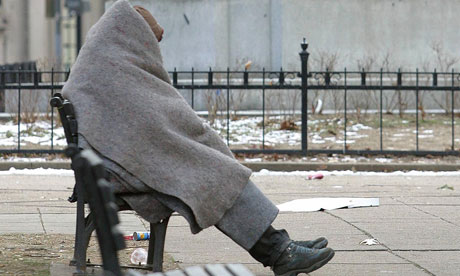 The Guardian:
The Guardian:
The viciousness of state officials to the poor and homeless is breathtaking, trapping them in a cycle of poverty
We do of course have a collective way of ameliorating the hardships of individuals and families – a government safety net that is meant to save the poor from spiralling down all the way to destitution. But its response to the economic emergency of the last few years has been spotty at best. The food stamp program has responded to the crisis fairly well, to the point where it now reaches about 37 million people, up about 30% from pre-recession levels. But welfare – the traditional last resort for the down-and-out until it was "reformed" in 1996 – only expanded by about 6% in the first two years of the recession.
The difference between the two programs? There is a right to food stamps. You go to the office and, if you meet the statutory definition of need, they help you. For welfare, the street-level bureaucrats can, pretty much at their own discretion, just say no.
Most cities, for example, have ordinances designed to drive the destitute off the streets by outlawing such necessary activities of daily life as sitting, loitering, sleeping, or lying down. Urban officials boast that there is nothing discriminatory about such laws: "If you're lying on a sidewalk, whether you're homeless or a millionaire, you're in violation of the ordinance," a St Petersburg, Florida, city attorney stated in June 2009, echoing Anatole France's immortal observation that "the law, in its majestic equality, forbids the rich as well as the poor to sleep under bridges."
In defiance of all reason and compassion, the criminalisation of poverty has actually intensified as the weakened economy generates ever more poverty. So concludes a recent study from the National Law Centre on Poverty and Homelessness, which finds that the number of ordinances against the publicly poor has been rising since 2006, along with the harassment of the poor for more "neutral" infractions like jaywalking, littering, or carrying an open container.
The report lists America's 10 "meanest" cities – the largest of which include Los Angeles, Atlanta and Orlando – but new contestants are springing up every day. In Colorado, Grand Junction's city council is considering a ban on begging; Tempe, Arizona, carried out a four-day crackdown on the indigent at the end of June. And how do you know when someone is indigent? As a Las Vegas statute puts it, "an indigent person is a person whom a reasonable ordinary person would believe to be entitled to apply for or receive" public assistance.
The viciousness of the official animus toward the indigent can be breathtaking. A few years ago, a group called Food Not Bombs started handing out free vegan food to hungry people in public parks around the nation. A number of cities, led by Las Vegas, passed ordinances forbidding the sharing of food with the indigent in public places, leading to the arrests of several middle-aged white vegans.
One anti-sharing law was just overturned in Orlando, but the war on illicit generosity continues. Orlando is appealing the decision, and Middletown, Connecticut, is in the midst of a crackdown. More recently, Gainesville, Florida, began enforcing a rule limiting the number of meals that soup kitchens may serve to 130 people in one day, and Phoenix, Arizona, has been using zoning laws to stop a local church from serving breakfast to homeless people.
Continue reading here.
No comments:
Post a Comment
Note: Only a member of this blog may post a comment.